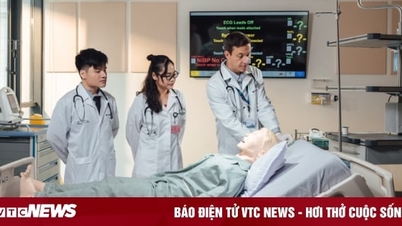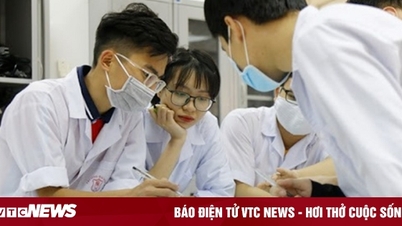The principal of Hanoi Medical University and experienced experts assessed that the high school graduation exam is difficult to meet admission requirements, and medical schools need to have an exam method to select people who are both talented and love their profession before 2025.
There are currently 27 medical schools nationwide, the main admission method is based on high school graduation exam scores, commonly in a combination of three subjects: Math, Chemistry, Biology (B00) or Math, Physics, Chemistry (A00).
This year, many schools have diversified their admission methods and combinations. Some schools have included Literature in their admissions combinations, causing mixed reactions, including opinions that this is just an admissions strategy and may not ensure the quality of the students.
Professor Nguyen Huu Tu, Principal of Hanoi Medical University, affirmed that for schools training in health care, input quality is very important.
"Good input leads to good output because studying medicine is very difficult, the knowledge learned is related to health - the most precious thing of human beings. Input is a prerequisite," Mr. Tu emphasized.
According to him, the current high school graduation exam no longer meets the admission target for highly competitive majors such as Medicine. Furthermore, this exam will change to match the learning style of the first batch of students under the new general education program who will graduate in 2025, but the specific changes have not been finalized. Therefore, medical schools need to urgently prepare appropriate admission plans.
The former head of a large medical university in the South believes that students studying medicine must meet high entrance standards but at the same time must have qualities suitable for the industry. From his many years of training experience and through surveying his students, he realized that the entrance exam results based on the graduation exam scores of a combination of three subjects do not fully reflect the qualifications, qualities, and suitability of a candidate for the medical industry.
So, besides the exam scores, what else can be considered? Dr. Le Viet Khuyen, former Deputy Director of Higher Education Department (Ministry of Education and Training), Vice President of the Association of Vietnamese Universities and Colleges, said that admission to specialized majors such as Medicine must go through two rounds, including preliminary and final selection. In which, the high school graduation exam results are only preliminary selection.
In this preliminary round, schools still consider the scores of the three subjects in the admission group. According to Mr. Khuyen, medical training in Vietnam today is to become a doctor right after graduation, so admission must be career-oriented. Therefore, no matter what combination of three subjects is built, two of them must be Biology and Chemistry - two core subjects of the medical profession.
Candidates who pass the preliminary round will enter the final round. In this part, Mr. Khuyen said that medical schools can organize an essay test in Biology - a core subject of medicine, or an oral test - a highly selective form applied by many famous schools in the world.
As in Japan, most medical schools have two rounds of admission. In round 1, candidates must pass tests in Natural Sciences (Physics, Chemistry, Biology), Mathematics, and English. In round 2, they must write essays and participate in interviews. Similarly, in the US, the interview round is arranged last in the admission cycle and is one of the factors that determine whether a candidate is accepted.
Sharing the same view, Professor Dang Van Phuoc, Chairman of the Council of Medical Professors, Dean of the Faculty of Medicine of Ho Chi Minh City National University, analyzed in more detail the interview process for candidates wishing to study Medicine.
Accordingly, candidates who have passed the preliminary round will be interviewed by a panel of doctors, psychologists, and lecturers about their social knowledge, human service perspective, ethics, and other qualities to decide whether the candidate is suitable for the medical profession or not.
According to Mr. Phuoc, the medical application should require an additional essay explaining the candidate’s reasons and orientation when choosing this major for the council to consider along with the interview results. These are factors that the three exam scores cannot reflect.
"After more than 50 years in the profession, I have realized that studying and practicing medicine without passion will make it very difficult to develop and overcome hardships to stick with the profession. Without passion, doctors will quickly get bored with the profession, work half-heartedly and easily go down the wrong path," Professor Dang Van Phuoc shared the reason why there should be an essay and interview section when enrolling in the medical school.
If medical and pharmaceutical schools still recruit students based on three subject scores, Professor Dang Van Phuoc said that they should be Math, Chemistry, and Biology. He said he respects the idea of encouraging the inclusion of Literature in the admissions group, but does not agree.
"Doctors must convince patients with scientific basis and medical knowledge, not with sweet, empty words," said Professor Phuoc.
During the 6 years of study, in addition to their major, students must study subjects such as Hospital Life, Medical Psychology and Ethics, and Health Education. During their training and practice at the hospital, students will be trained in medical ethics, sharing skills, understanding patient psychology, learning how to write theses and medical records, and practicing explanation and presentation skills, he said.
Without mentioning the issue of whether to include essay writing or interviews in medical school admissions, Professor Nguyen Huu Tu affirmed that there should be a common tool for medical schools to recruit students from 2025 so that it can both filter out fake candidates and ensure input quality.
Many opinions shared that Medical and Pharmaceutical schools can organize a separate exam, but Mr. Tu said that this is wasteful and not very effective because only a few "hot" majors such as Medicine and Dentistry need a separate exam.
The leaders of Hanoi Medical University proposed that medical schools create a common tool to meet the entrance requirements of the Medical and Pharmaceutical sector by ordering prestigious universities that are organizing good competency assessment exams such as the two National Universities, Hanoi Pedagogical University or Hanoi University of Science and Technology. One possible direction is that schools agree to take the results from a certain subject group from the available competency assessment exams and then agree on the threshold to ensure the quality of the entrance exam.
"Candidates can take one exam but use the results to apply to many schools, helping to avoid waste," said Mr. Tu.
Mr. Le Viet Khuyen emphasized that regardless of the form of admission, the most important thing is to ensure program standards and output standards.
According to Decision 436 of the Prime Minister in 2020 on the promulgation of the plan to implement the Vietnamese national qualifications framework for higher education levels in the period 2020-2025, the Ministry of Health is in charge of developing training program standards for the Health sector. After that, the Ministry of Education and Training will review and promulgate. This standard has not yet been promulgated.
The Ministry of Education and Training will establish councils to evaluate and promulgate training program standards for majors and sectors of each field in higher education, to be completed in the third quarter of this year.
"The input may be 100 people, but if during the learning process 5-10 people meet the program's standards, this number will graduate," said Mr. Khuyen.
Duong Tam - Le Nguyen
Source link






![[Photo] Prime Minister Pham Minh Chinh chairs conference on anti-smuggling, trade fraud, and counterfeit goods](https://vphoto.vietnam.vn/thumb/1200x675/vietnam/resource/IMAGE/2025/5/14/6cd67667e99e4248b7d4f587fd21e37c)



























































































Comment (0)